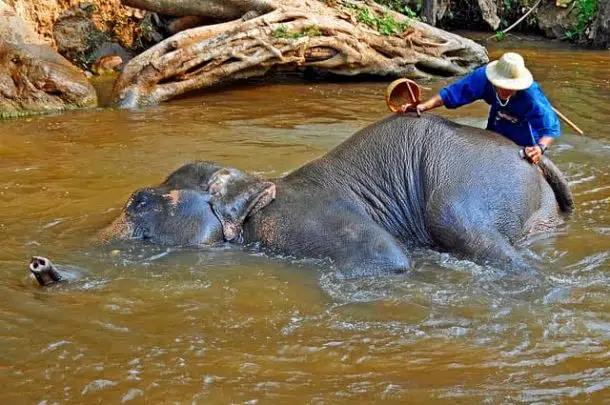I'm sitting writing this blog to the sound of cicadas producing their screeching song outside my window, and the feeling of sweat running down my chest and back, which means to most Chiang Mai people it's the hot season.
March to May it gets Hot
The rains here stop in November, and apart from occasional ‘mango' rain storm in March, they don't really start again until late May. It gets pretty hot during this period and daytime temperatures can hover around 40C (104 F) during the day from March to May. It's a dry heat though and for me it doesn't feel too uncomfortable. Coming from a cold, wet and miserable country, I actually enjoy this time of year: the bone I broke in my right wrist when I was nineteen but didn't allow to set properly because I took off my plaster-cast in order to go swimming, doesn't ache; my washed clothes dry in ten minutes; cold beer tastes as good as it looks in adverts. However, it's not all sunshine, so to speak. The hot season also brings poor air quality and the environmental and health problems associated with this.
For this blog I'm going to write about our hot season: the good, the bad and the ugly.
Chiang Mai Hot Season - Songkran
Let's start with something good. Around the middle of every April, Thailand, along with many other Asian countries, celebrates New Year. In the Land of Smiles this holiday is called Songran and generally involves drunken revelry and water fights. In most parts of Thailand this holiday lasts one or two days, but in Chiang Mai we keep throwing water at each other for a whole week. Schools, banks and government buildings are closed. Improvised food and alcohol stalls around the moat and Tha Pae road open, and the death rate due to drunken silliness sky rockets.
In years gone by I used to park my Honda dream near the end of Huay Kaew Road on the mountain-side of the old city and then walk with a few friends around the moat until we reached Tha Pae Gate. For most of this journey we only met Thais, and no matter how drunk they were, everything and everyone deserved a smile. We would stop at improvised ‘illegal' alcohol stalls and down a few rice whiskies at 8 baht a shot. This whisky, or lao kaow as it's known to locals, contains enough potential energy to send a rocket to the moon.
Chiang Mai Songkran - Unwritten Rules of Play
A leisurely 3-hour walk would eventually lead us to the Tha Pae Gate area and ‘farangs'. I realize tourists don't know the unwritten rules of Songran water fighting, but common sense should tell someone not to throw water at a person who obviously doesn't want to participate in the fun. The small minority who don't know the rules can poison Songran for some long-term foreign residents who stay at home rarely venturing out all through this week. Bah, humbug.
I've been talking about a generalized hot season, but I think it's important to mention that this year's season has been a particularly strange one. There have been consecutive days we experienced maximum temperatures of 23C when they should have been hanging around the mid to high thirties. There have been prolonged rain storms which have sometimes taken a few days to leave our valley at a time of year when the atmosphere should be so dry that large cracks open the soil; dust should cover leaves, so it appears trees are covered in a light sprinkling of snow. However, I've never experienced a hot season like this one before, and this is my twelfth. Is it just a freak year or are changes taking place? I guess we won't know until, or unless, a pattern over a number of years emerges.
The Hot Season in Chiang Mai - Air Quality
One of the really nice things about the hot season this year is the improvement in air quality. For the first time since I arrived, mountains on both sides of the valley can be seen. I remember past years when Doi Suthep mountain disappeared for months in a smog of dust and pollution. The rain really has done a good job preventing burning and settling dust and all the nasty little particles emitted by motorized vehicles and fires. However, we can't always rely on nature to correct the selfishness of man. Despite the best intentions, I'm sure my efforts don't contribute a great deal to improving the environment. I would like to do more, but I always have an excuse to avoid participating in some of the projects started by locals which aim to clean our valley.
That's it for this blog. It's now time to head back to the training room to talk about my past participles.
Discover TEFL teaching in Thailand.
This blog was first published May 2nd, 2011 on ajarn.com.
